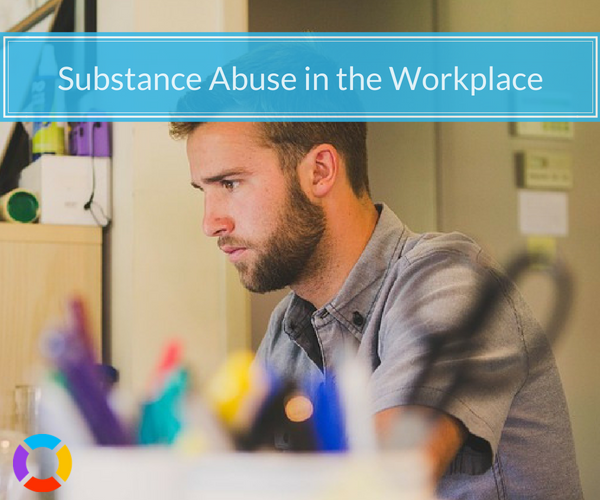Workplace Addiction

Addiction in the workplace is a serious problem. According to recent research, around 46 million Americans age 18 and older have some kind of substance use disorder, and almost two-thirds of them are employed.
Employers and employees must be vigilant, recognizing the signs to determine if someone close to them is using. This vigilance, coupled with addiction treatment approved or sponsored by one’s workplace, can be the best way to ensure that employees safely recover from this issue and avoid any potential workplace accidents.
If you or someone you know has been using drugs or alcohol to a dangerous degree and needs help, call 800-996-6135 today. Our treatment advisors are happy to help you find the safest, most effective detox and rehab facilities for your needs, including programs that will be approved through your group or workplace insurance plan.
Workplace Addiction: How and Why It Happens
One of the main reasons an individual may start to abuse drugs and alcohol as a result of their professional life is an abundance of stress.
Many different studies have linked stress with substance abuse. In fact, stress seems to be the number one cause of this problem. People who are under a lot of stress are also much more likely to become addicted to drugs or alcohol if they begin to use.
- People with stressful jobs are among the most likely to use drugs and alcohol dangerously. Being stressed at work causes many people to want to numb themselves or take the edge off when they come home. One of the easiest ways to do this is to use drugs.
- In many cases, using drugs and alcohol feeds into one’s stress and anxiety at work, making the individual less able to deal with this issue when they cannot use. Marijuana in particular increases one’s chances of developing anxiety and depressive disorders. This can be serious since many individuals use the drug to minimize feelings of stress.
- Some individuals start to use drugs at work once they become addicted. Addiction causes an individual to put their drug abuse above all else. When they begin to put their substance use first, they may want to bring the drug with them to work or come into their job high.
Even if an individual only uses drugs outside of work, it can still affect their performance at work. People who use drugs and alcohol heavily are more likely to change jobs three times or more during a year, are more likely to be absent or request time off, and are more likely to be involved in an accident at the workplace. Alcoholism alone causes more than 230 million lost workdays every year.
Sadly, many individuals look at substance abuse and addiction as problems that only unemployed people have. When you begin to understand why people with jobs will also abuse dangerous substances to a serious degree, you can recognize how someone you know—or maybe even you yourself—has been putting your professional life at risk for drugs or alcohol.
Contact Detox.com now to find drug and alcohol detox centers near you!
Recognizing Addiction in the Workplace
Recognizing addiction in the workplace is an important part of helping those who need it most. It isn’t about finding someone out and tattling on them, but rather about ensuring that everyone in the workplace is as safe as possible. You can recognize substance abuse in a coworker or employee using the signs listed below.
- The individual is constantly absent from work with no explanation, often tardy, and uses their sick leave excessively
- They often give excuses for absences that were emergencies, including car trouble, family issues, etc.
- They frequently have performance issues at work, including not being able to meet deadlines, providing sloppy work, or not meeting their quotas
- They constantly make excuses for their performance problems, not wanting to accept that the issue is their own or promising to perform better in the future
- They act hostile or belligerent (or potentially even violent) at work often, which leads to disputes between coworkers and potentially customers
- They fall asleep while at work
- They are regarded around the workplace as a loner or someone who does not engage with other coworkers
- They smell like alcohol, marijuana smoke, or another type of substance
- They have bloodshot eyes, tremors, or other physical signs of frequent substance abuse
- They do not care about their hygiene or physical appearance
- They are extremely secretive in their behavior, often disappearing without telling anyone where they are going
- They become hostile when confronted about their substance abuse
It is important to remember that many of these signs could potentially be associated with other problems, but noticing several of them in one individual (especially when they are consistent and frequent) strengthens the likelihood of addiction.
How Can I Help a Coworker with an Addiction?

People with stressful jobs are at high risk of addiction.
You can help a coworker with a substance use disorder. If this individual is someone you are very close to, you may be able to stage an intervention with some of their closest friends, coworkers, and family members. It’s important to seek guidance from an intervention specialist if you believe the person may react violently. If, however, you are not close to them, it is more important to be careful about how you approach them.
You may be a supervisor and feel comfortable talking to the individual based on the specific code of conduct set forth by your company.
If you are not, however, it could require you to bring these concerns to a supervisor. Employee assistance programs (EAPs) often have protocols for this type of situation to help people with addictions find the treatment they need through their workplaces.
Treatment Options for Professionals Addicted to Drugs and Alcohol
People who have jobs but are also addicted to drugs should still seek help. One of the biggest barriers to this is that many individuals are afraid that if they do admit to having a substance use disorder, they will lose their jobs. However, most workplaces today have approved substance abuse treatment programs available through their EAPs. Those who choose to attend these programs don’t have to worry about losing their jobs and can continue working once they finish treatment.
Many EAP-based treatment options provide short-term counseling services or help for individuals who want to be linked with professional treatment centers. If you need to go through a specific program to ensure you won’t lose your job, please let us know when you call. We will help you find the best option for your personal and professional needs.
Many recovery programs start with detox.
- Detox is a medically supervised withdrawal program where individuals can put an end to their dependence on drugs and alcohol. Everything is done safely and under the supervision of medical professionals.
- One must remember, however, that detox alone is not a standalone addiction treatment. This program must be followed with rehab for the individual to recover safely.
After detox, rehab is the next step of recovery.
- People who attend rehab may choose between inpatient or outpatient treatment based on the severity of their addiction and their need for a safe, stable recovery environment.
- Medications and behavioral therapies are often used together to treat addiction as well as any co-occurring mental disorders from which the patient may be suffering.
- Many rehab centers also offer holistic treatments such as yoga, dance or art therapy, meditation, or acupuncture. While these programs aren’t based on as much scientific research as the evidence-based practices mentioned above, they can be extremely beneficial to those in recovery.
- Many rehab programs that are sponsored by one’s workplace will inclue certain short- and long-term options to help recovering employees. For example, urine tests are sometimes necessary, as may be a provision requiring the employee to attend 12-step meetings.
The most important thing to remember when you are seeking help for yourself or a loved one suffering from addiction is that the stigmas associated with this issue should not prevent you from finding the care you need. Many people can recover safely with the help of addiction treatment, and a large proportion of these individuals go on to improve their social, psychological, and occupational functioning.
Making sure your workplace understands your needs and offers you support can also improve your performance in treatment and increase your likelihood of completing the program. Find out what options are available to you through your EAP so you can recover as safely and effectively as possible.
Getting Help for Workplace Substance Use Disorders
People suffering from substance abuse disorders don’t need to hide the problem from their employers. Stepping up and speaking out could be the bravest thing you do. Seeking treatment is necessary to avoid the dangerous consequences of this disease. Call 800-996-6135 now to speak with a treatment advisor, and we can help you find the best care to suit your needs.

